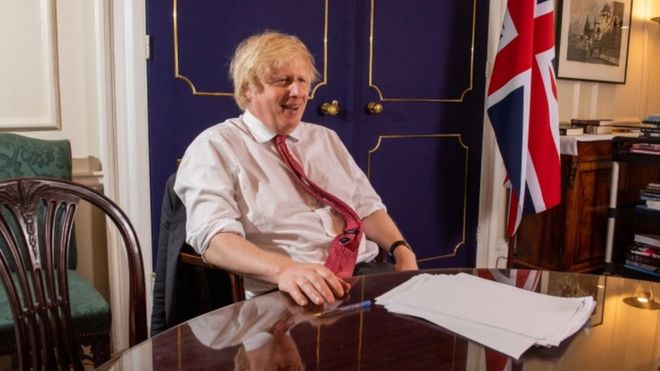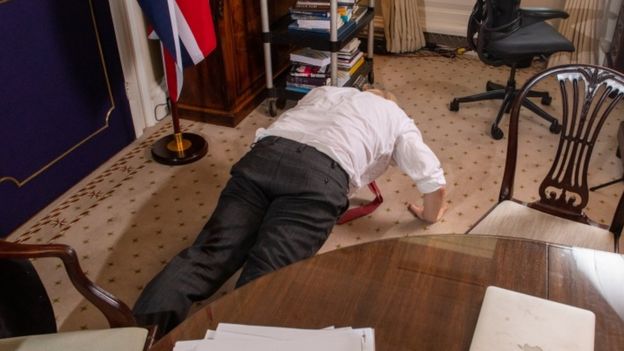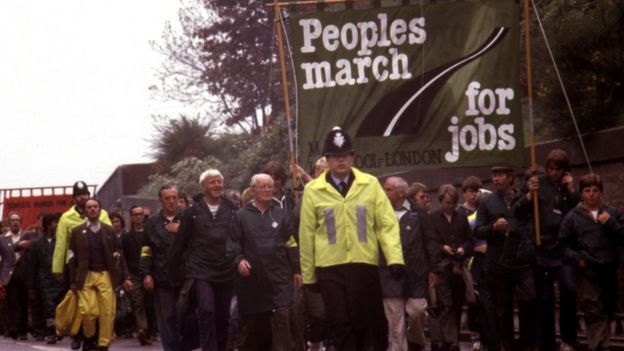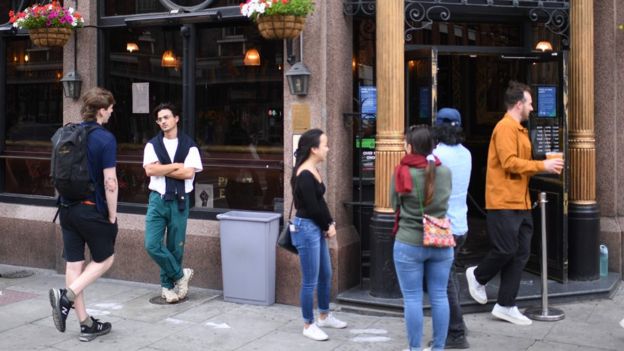 IAN MCILGORM/THE MAIL ON SUNDAY
IAN MCILGORM/THE MAIL ON SUNDAY
The prime minister has pledged his government will "not go back to the austerity of 10 years ago" ahead of a speech on Tuesday.
In an interview with the Mail on Sunday, Boris Johnson set out his plans for a post-lockdown economic recovery.
They will include a new taskforce which will look at speeding up the building of hospitals, schools and roads.
But Labour has accused the government of "pulling the rug from under" many parts of the economy.
The economy shrank by 20.4% in April - the largest monthly fall on record.
- Job cuts warning as 600,000 roles go in lockdown
- Ex-chancellor warns against return to austerity
- UK debt now larger than size of whole economy
Amid continued criticism of the way his government has handled the pandemic, the PM told the paper that ministers will be "doubling down on levelling up" - spending on infrastructure in order to "build our way back to health".
"If Covid was a lightning flash, we're about to have the thunderclap of the economic consequences," he said.
"We're going to make sure that we have plans to help people whose old jobs are not there any more to get the opportunities they need."
 IAN MCILGORM/THE MAIL ON SUNDAY
IAN MCILGORM/THE MAIL ON SUNDAY
In the Mail on Sunday article, the PM said the country would "bounce back" from the pandemic. He reinforced his message by doing press-ups to show he is "fit as a butcher's dog", following intensive care treatment for the virus in April.
Meanwhile the UK's coronavirus death toll rose by 36 on Sunday to 43,550.
Scotland recorded no new coronavirus deaths for a third consecutive day, and there has been one more death in Northern Ireland.
An Infrastructure Delivery Taskforce, led by Chancellor Rishi Sunak, aims to help to remove "bottlenecks" faced by major projects.
No 10 hopes a building boom will boost jobs and improve connectivity for cities, towns and villages.
'Thatcher levels of unemployment'
Paul Johnson, director of the Institute for Fiscal Studies, said "really good" infrastructure projects could give some immediate "payback" by increasing the number of people in work and the "amount of demand" in the economy in the short term.
But he told the BBC that the "risks" could include spending money in the "wrong way" and doing things too quickly - which could result in "low-quality infrastructure projects which don't pay for themselves".
He said over the next year, a lack of jobs will be the "most important" challenge, and called on the government to consider supporting people through training and job subsidy schemes.
He warned there was a danger the UK could return to "levels of unemployment we haven't actually seen for decades".
Analysis commissioned by the Labour Party suggests that unemployment levels could soar to levels not seen since the 1980s - tipping past the peak of 3.3 million seen in 1984 under Margaret Thatcher, the Observer reports.
Shadow business secretary Ed Miliband warned of such "Thatcher levels of unemployment" if sectors, such as hospitality, cannot fully reopen.

He accused the government of "pulling the rug from under" many parts of the economy by telling firms they will have to start paying towards the furlough scheme from August, before it closes entirely in October.
Mr Miliband told the BBC's Andrew Marr Show there needed to be a bridge between the end of the furlough scheme and a job creation programme.
He also criticised the government for not announcing a summer Budget this year when the UK is facing potentially the worst recession in 300 years.
Addressing reports that the PM wants to help areas previously affected by austerity, Mr Miliband replied: "There's a grand canyon between his rhetoric and the reality."

Boris Johnson has faced serious criticism for the way his government has handled the coronavirus outbreak - and questions are likely to continue as ministers look to ease the lockdown in England.
But evidently keen to try and get his wider political agenda back on track, the prime minister is returning to the phrase that was so frequently used in last year's general election campaign - "levelling up".
It means spending on infrastructure - schools, transport and the NHS.
So, how will these big projects be paid for?
With billions already spent to support the economy during this pandemic, borrowing, big time, seems on the cards.
The number of workers on UK payrolls dived by more than 600,000 between March and May, official figures suggest, with economists warning the full effect on employment will not be felt until wage support schemes end.
Almost nine million workers who are unable to do their job because of the pandemic have had their wages paid by the government under its furlough scheme.
In a major easing of England's lockdown to help to reopen the economy, the PM announced on Tuesday that pubs, restaurants, hotels and many other businesses would be allowed to welcome back customers from 4 July.
 AFP
AFP
But the announcement was criticised by some businesses - such as indoor gyms - that were not included on the list.
And Sir Jeremy Farrar, a member of the government's Scientific Advisory Group for Emergencies (Sage), warned there could be a "very nasty rebound" of coronavirus in the winter if the country does not use the next few months "sensibly".
- Pubs fear that new opening rules won't save them
- 'It was a shock' - the businesses not allowed to reopen
First Minister of Wales Mark Drakeford criticised the government's messaging around the easing of lockdown restrictions in England. He accused the PM of suggesting that coronavirus was "all over" and normal life can resume.
No comments:
Post a Comment